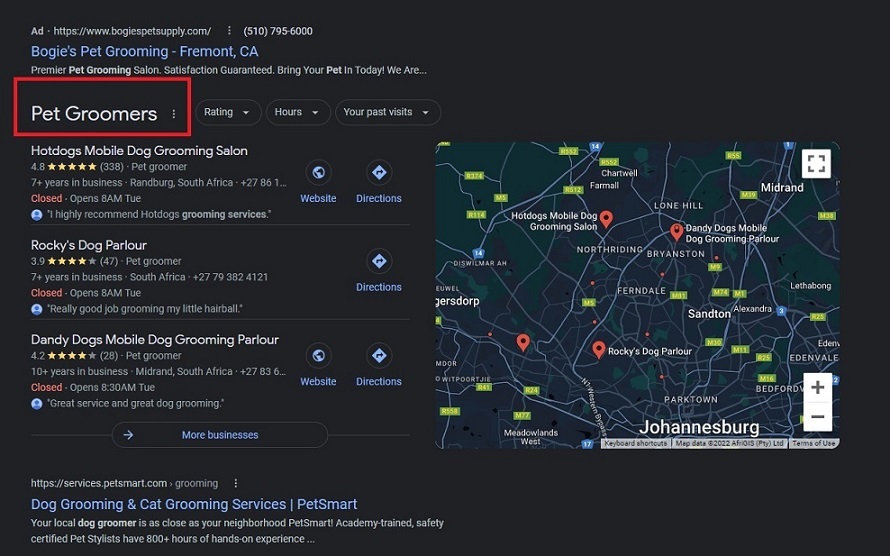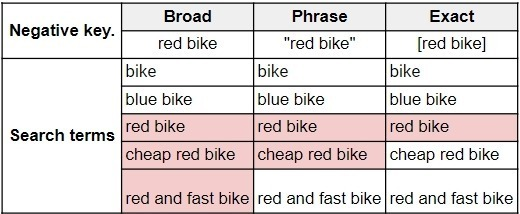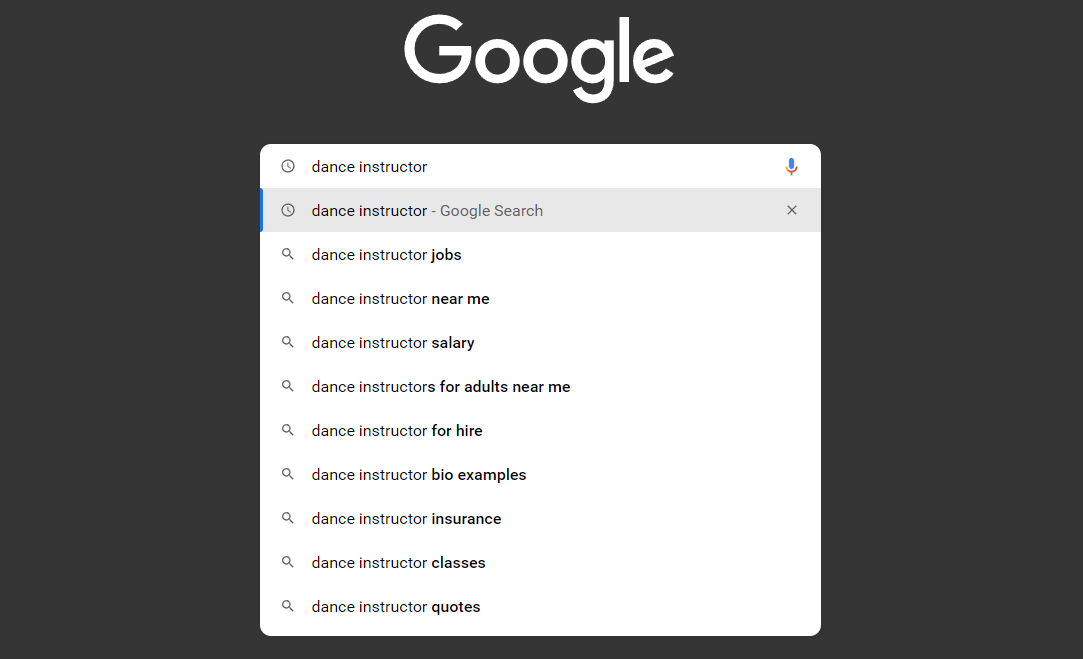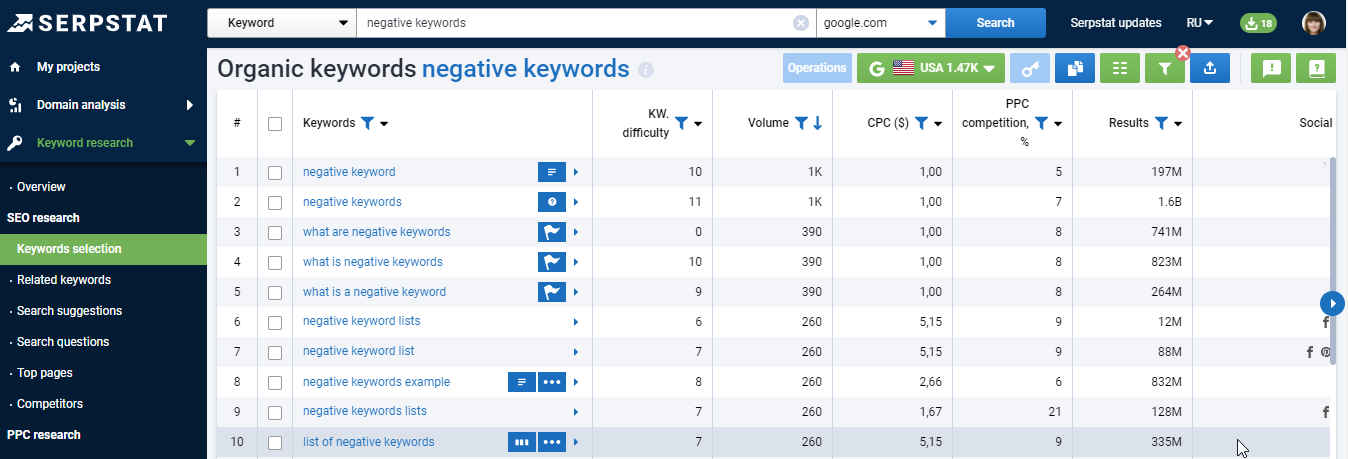Start Exploring Keyword Ideas
Use Serpstat to find the best keywords for your website
What Are Negative Keywords & Do They Help SEO?

They don’t give much thought to negative keywords. But, if you have ever conducted a search on Google to find an answer to a specific question, but received a result that meant something else entirely, then you have experienced what happens when negative keywords are not used.
In this article, we're going to look at what negative keywords are, how they’re different from positive keywords, and how they help SEO.
You’ll discover the different types of negative keywords and when to use them, as well as some tips for optimizing negative keyword use.
If you’re ready, let’s get started!
What are Negative Keywords?
Keywords are words, phrases, ideas, or topics that define what your content is about. In terms of search optimization, keywords are what searchers type into search engines to find the information, products, or services they are looking for.
You want to focus on using these types of keywords to your site so that when people search for them, your site will show up.
So, for example, someone who runs a dog grooming service might include keywords such as “dogs”, “grooming”, “salon”, “bath”, and other keywords associated with grooming dogs throughout their site, making it more likely that the website will pop up in the results for a search like “best dog grooming service near me”, or “pet groomers”.

A negative keyword refers to a word or phrase that prevents your online ad from being triggered.
It’s a keyword targeting option (or PPC match type) offered by a lot of search engine ad platforms like Google Ads and allows you to selectively filter which visitors see your ads based on their queries.
In other words, if someone is searching for that specific keyword, your ads won't be shown to them. This is otherwise known as a negative match and is useful for ensuring that only the right people see your ads at the right time.
Negative Keywords vs Positive Keywords
- Positive Keywords: These are mainly used strategically within organic SEO content. They can also be used for advertising as a way to target keywords for landing pages, SEO articles, social media content, and various other organic digital marketing content.
- Negative Keywords: Negative keywords are used primarily as part of online advertising. These types of keywords (and the topics they are associated with) can also be used by content creators and digital marketers as a way to determine what should be excluded within SEO content.
In short, you can think of negative keywords as sort of gatekeepers that help ensure that your online content or ads are served only to the people to whom they're relevant.
Do Negative Keywords Help SEO?
Definition of SEO
The most common way to accomplish this for your site is to focus on adding keywords to your content that people are searching for when they want to find products or services like yours.
For example, if your website sells ergonomic keyboards, you might optimize around keywords such as:
- Keyboards
- Ergonomic keyboard
- Wired economic keyboard
- Best budget ergonomic keyboard
- Ergonomic keyboard split, etc.
Optimizing your website for these and other similar keywords will increase your website’s visibility and ensure that your content shows up for relevant searches, generating targeted traffic to your site.
SEO proposals are an important part of any website's success. With the right optimization, you will be able to improve your site loading speed and have a better chance at ranking on Google for specific keywords that are relevant in relation to what they offer their customers or visitors.
The Use of Negative Keywords in SEO
Note that there is no way to add negative keywords for SEO.
You can only avoid the use of that word or phrase in your website or blog content, meta title, description, alt text, and any other content you’ve included. By excluding certain keywords, you ensure that your organic content and ads simply don’t rank for that keyword, thereby preventing unqualified traffic to your site and reducing lost revenue from unwanted clicks
Negative Keywords For Ads: Using the example above, you may want to add some negative keywords for search terms such as "electronic keyboard" to your PPC campaigns because such a person would not be looking for a computer keyboard, but rather a musical instrument. Using negative keywords in such a case will help you filter out irrelevant searches in your Google Ads and conserve your ad spend.
Negative Keywords In SEO: In terms of SEO, you can keep a list of negative keywords to avoid using in your website and blog content so your site pages aren’t displayed to the wrong people. So, for example, a luxury watch brand like Rolex might avoid the use of the word “cheap” in its blog posts and website landing pages to repel unwanted traffic to their site and lessen the chances of its content being shown to people whose budget just doesn’t allow for the purchase of a high-end watch.
To ensure the negative keywords are properly excluded requires defining negative keywords before you begin using a website builder to design your site. You need to make sure that nothing on your site could accidentally trigger Google to generate hits on keywords you don’t want to rank for.
This means every landing page, blog article, and all other pieces of on-site content must be purposefully designed to exclude negative keywords and include only those positive keywords which are relevant to the brand, its specific offerings, and its culture.
Benefits of Using Negative Keywords
- Find Your Target Audience: Negative keywords simultaneously help you save money on worthless impressions while also targeting the right customer segment with your message. This ultimately results in higher conversions and a boost in your bottom line.
- Stretch Your Marketing Budget: If your ad is continually shown on irrelevant searches, you'll lose a lot of money on wasted clicks. But, with the right use of negative keywords, you'll be able to prevent that, save money, and create opportunities for your ad to display on relevant searches that are more likely to lead to conversions.
- Improve Your Click-Through Rate: Another advantage to adding negative keywords is that it exposes your account to a lot fewer uninterested impressions, which increases the percentage of visitors who go on to click on your ad.
- Reduce Bounce Rates: Negative keywords will help you avoid showing pages that aren't relevant to users' search queries. For example, if you own a cake bakery, you don't want people clicking on your ad looking for cake "recipes", so you might use that as a negative keyword and this will help reduce bounces from your website when people land on your homepage only to realize that your content isn’t what they're looking for.
- Increase Google Relevancy: Yet another awesome benefit of using negative keywords is that it helps provide an enhanced user experience and Google uses this as a relevancy factor. The higher your relevancy, the higher your rankings.
- Align Omnichannel Marketing Strategies: Because negative keywords are excluded from all on-site content, it makes sense to exclude them from other digital marketing content. This can help you better determine names for hashtags, social media content captions, names for branded classes hosted on online course platforms, podcast titles and descriptions, email newsletter copy, and much more. By knowing what positive keywords to include and what negative keywords to exclude, every part of an omnichannel marketing campaign can be more easily aligned together to create a recognizable brand culture across multiple channels.
Types of Negative Keywords
The ability to choose between these types of keywords means you have more control over what your ad shows up for.
For example, sometimes you want your content to show up for broad phrases rather than exact match searches. With negative keywords, you’ll have more control over where your content doesn’t show up.
Here's a closer look to give you a better idea of how each type of negative keyword works - and where to use it.
1. Broad Match Keywords
But, if the person leaves out one or more words from the search query, the ad will still be shown.
For example, imagine that you are starting a landscaping business and have found that your business shows up when people are searching for “gardening store.”
The people searching for “gardening store” are likely searching for a store that sells gardening supplies, not a business that provides landscaping services. Though this is an evident difference in search intention, Google does not understand this.
So you have to help Google understand, and by excluding negative keywords like “gardening store,” “hardware store,” and similar keywords from your landscaping business website, you may be able to teach Google how to get your site in front of the people that have an actual want or need for landscaping services.
Excluding the negative keyword “gardening store” and related negative keywords from on-site content may negate any queries that include part of the entire keyword but —even in instances where the words are not in the same order.
Here are a couple of examples where the ad would show:
- Landscaping Services
- Landscaping near me
And here are a few examples where the ad would hopefully not show:
- Store for gardening supplies
- Hardware and gardening
- Best gardening store near me
Excluding negative keywords doesn’t necessarily mean you won’t rank for those terms. If the content on your site is similar to other content ranking for those negative keywords, or you have a backlink profile of gardening stores, then you may still discover your landscaping business site ranks for negative keywords even when they have been thoroughly removed from all on-site keywords.
In other words, while excluding negative keywords can help you to not rank for undesired keywords and to reduce unwanted discovery, there are other factors that can limit the effectiveness of excluding these keywords.
2. Phrase Match Keywords
Using the “running shoes” example above, a negative phrase match keyword would be something like “running shoes for women”.
But, the ad would still show for a keyword like “shoes running”.
These types of keywords are a little less restrictive and your ads would be shown for any search queries without the phrase “running shoes”.
This is because this keyword variation only negates search queries with the exact specified phrase. Any search query that has more words than the negative phrase match keyword (but contains the exact phrase) would mean that your ad budget is safe.
Thalita Ferraz from HerBones.com explains how negative phrase match keywords have helped her increase traffic and generate more profit:
3. Negative Exact Match Keywords
This option is great for use when it comes to brand names and other keywords that are close together, or if your offer is very similar to a competitor’s.
So, for example, using exact match negative keywords for the "running shoes" example, the following ads would be eligible to show:
- Google running gear
- Blue tennis shoes
- Shoes running
- Blue running shoes
The ad wouldn't show because this type of keyword exists solely for eliminating specific search queries. If someone types in the exact words "running shoes, with no extra words, your ad will not be shown.

No matter which ad network you are using, know that adding too many negative keywords will likely have an adverse impact on your reach and you might lose out on a lot of prospects.
However, a carefully curated list of negative keywords has the potential to save you tons of money, so you have to strike a delicate balance between the two.
So What Does All This Mean for Your SEO?
But, how do you bring all this information together to help you make use of negative keywords in your SEO?
The bottom line is that using negative keywords will not help your search engine optimization, but avoiding them certainly will.
The information outlined in this article will help you research negative keywords for your business and you can then avoid using them in your SEO content. This way, you’ll banish ambiguity and avoid getting traffic that is not relevant to your web pages.
Working on the assumption that your main business objective is to generate as many conversions as possible from an ever-growing number of paying customers, you stand to benefit quite a lot from the use of negative keywords.
You'll be able to tighten up the relevance of your ad groups, with one ad speaking to a complete set of keywords while increasing the chances that the people who actually click on your ad will go on to convert into paying customers.
Your list of negative keywords will also repel irrelevant traffic from your website pages, thereby reducing your bounce rates and helping to increase your relevancy on Google.
All of this = higher rankings = more qualified traffic = better conversions = more sales = an improved bottom line!
Drawbacks of Using Negative Keywords
I've outlined the advantages of using negative keywords in the section above, now let's look at the drawbacks.
The biggest drawback to using negative keywords is that while it works to eliminate uninterested buyers from accessing your pages, this tactic can actually work against you if heavily utilized by reducing the chances of potential buyers accessing your ad or webpage.
For example, say someone was browsing online for the perfect gift for their son, who is an avid athlete. Even if they weren't looking for anything specific, there's a chance they might consider purchasing some of your gear (remember your running shoes website?) once they've been exposed to your content or ad.
By using negative keywords, you decrease that possibility.
How to Find Negative Keywords
Here are some of the most effective ways to identify negative keywords for your business.
1. Manual Google Search
On the results page, check out the "People Also Ask" section and scroll to the bottom of the page where you'll see “Related Searches”.
This is a great way to discover the types of keywords that are related to your main search. If you see a lot of unrelated ads, videos, or links on the results page, take note of those items and add the words to your negative keyword list.
Do a quick search for at least the top 10 keywords that you are considering for advertising. Add any negative keywords, you come up with to your list and dodge them in your SEO content.
Here's a quick example:
Say you are a dance instructor. If you conduct a quick search for the keyword "dance instructor", you'll be met with a range of results including the following:

If you are offering online courses, you may even want to get rid of the keyword "dance instructor near me" because you know that anyone who’s searching for this is likely looking for a local dance studio where they can go and take lessons in a physical space.
In such a case, the terms "jobs", "free", "near me", etc. would be negative keyword terms to add to the list you'll apply to various marketing campaigns (PPC, SEO, etc.)
2. Keyword Research
Your keyword research will reveal to you the language of your target audience, including the words and phrases they use when searching for content, products, and services such as the ones you provide.
You'll have to check keyword rankings, compare, and prioritize the best keyword opportunities for your website. During this process of analyzing the search terms to target, you can begin picking out words to add to your negative keyword list.
In keeping with the theme so far, a shop selling running shoes would probably want to avoid searchers that are looking for dancing shoes, winter shoes, high-heeled shoes, etc.
You'll be able to add those specific terms to your negative keyword lists during your research to make your work easier when creating your ad campaigns and SEO website content.
3. Search Term Report Analysis
You will see what users actually search for whenever your ads are triggered. An in-depth look at this search term report (STR) will give you insights into any new keywords you might have missed. You’ll also be able to identify negative keywords that don’t have the desired search intent and exclude any irrelevant search terms.
To get started using this tactic, simply locate the SDR in your Google Ads account. Choose the date range you want, and click “Download”. Once you've downloaded the results, you can track specific performance, attributes, or conversion metrics by customizing column sets.
After analyzing the data, you can then add the negative keyword terms to your account (or to your list if using negative keywords for SEO).
Pro Tip: If left for a long time, these types of SEO reports can become increasingly difficult to manage and review, so make sure you review your campaign search terms on a regular basis to stay on top of your ad and SEO marketing campaigns.
4. Negative Keyword Generator

At a glance, you'll be able to see which words are used by your competitors as negative keywords, giving you a great starting point for formulating your own negative keyword strategy.
For the most part, these are paid tools, but your money will be well spent and you'll get a great return on your investment in the long run.
For one thing, the software will do much of the work for you finding the right types of negative keywords for your business based on what your competitors are using.
These tools will save you much of the time and effort you might otherwise expend on trying to discover negative keywords through your own manual research. In just minutes, you'll have a large list of negative keywords to (not) use on your website and apply to your online ads.
Conclusion
By following the advice here, you'll save money on your paid campaigns, reduce your website bounce rate, and increase conversion rates by providing visitors with relevant content.
And, there are many other additional benefits for your SEO and Ad Strategy, such as:
- Increase conversion rate
- Improve the relevance of your ad groups
- Improve click-through rate (CTR)
- Save your business money
- Attract more relevant users to your site
- Improve ROAS (Return On Ad Spend)
Now that you know all the reasons why you should use negative keywords for your SEO campaigns, what are you waiting for?
Speed up your search marketing growth with Serpstat!
Keyword and backlink opportunities, competitors' online strategy, daily rankings and SEO-related issues.
A pack of tools for reducing your time on SEO tasks.
Discover More SEO Tools
Backlink Cheсker
Backlinks checking for any site. Increase the power of your backlink profile
API for SEO
Search big data and get results using SEO API
Competitor Website Analytics
Complete analysis of competitors' websites for SEO and PPC
Keyword Rank Checker
Google Keyword Rankings Checker - gain valuable insights into your website's search engine rankings
Recommended posts
Cases, life hacks, researches, and useful articles
Don’t you have time to follow the news? No worries! Our editor will choose articles that will definitely help you with your work. Join our cozy community :)
By clicking the button, you agree to our privacy policy.

